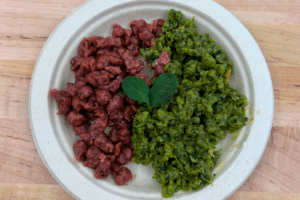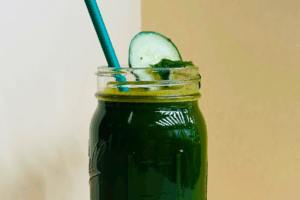By: Pamela Honey
Connecting Students, Farms, and Fresh FoodEmpty heading
At DeWitt Clinton Educational Campus, the cafeteria and the Teens for Food Justice farm work hand in hand. Students grow the produce, and Ms. Karla Jean Peterkin-Taylor makes sure it reaches their plates. As the school’s cafeteria manager, she’s seen how the farm shifts students’ attitudes toward food—from hesitation to pride.
Before the farm, students often refused to try vegetables. Now, they’re excited to share what they’ve grown. Ms. Peterkin-Taylor says it’s common to hear them say, “Try it, see what I made, Miss.” That sense of ownership has changed the atmosphere in the cafeteria.
Empty headingEmpty heading
Seeing Change Up CloseEmpty heading
When students recognize the lettuce on their trays as something they helped grow, they approach it differently. Ms. Peterkin-Taylor describes how they proudly invite their peers to taste it or ask if she’s visited the farm. The excitement, she says, “is there.”
They’re also trying more foods than before. While some still stick to familiar items like lettuce, she notices them taking small steps. “They will try what they grow,” she says, “maybe not in big quantities yet—but they’re trying.”
“They will try what they grow,” she says, “maybe not in big quantities yet—but they’re trying.”
Building Healthy HabitsEmpty heading
Working with fresh produce from the farm takes extra care—washing, chopping, and preparing—but Ms. Peterkin-Taylor says it’s worth it. “It looks so appealing and attractive that it makes us want to touch it, want to try it.”
Her team now serves garden salads and salad bowls daily, turning farm-grown greens into meals that feel both fresh and familiar. She hopes the lessons extend beyond the cafeteria. Students, she says, are “learning to eat balanced diets from what they get in the cafeteria and what they can put on their plate at home.”
A Partnership That WorksEmpty heading
The collaboration between the cafeteria team and TFFJ’s farmer-educators has grown over time. Ms. Peterkin-Taylor calls it a “good partnership,” describing TFFJ staff as motivated and supportive. “It feels good to work with people who want to do the job and also like to help you with your job,” she says.
She hopes more students will get involved with the farm and see how their work connects to what’s being served. Each harvest, she adds, “impacts us” in the kitchen and encourages new conversations about food and health.
Looking AheadEmpty heading
For Ms. Peterkin-Taylor, the farm has brought new energy to the school. “It gives a new vision and new birth to the school,” she says, proud that visitors now come to see it firsthand. More than anything, she wants students to view nutrition differently—to see that eating well can be enjoyable and empowering.
“It gives a new vision and new birth to the school”
Through her partnership with TFFJ, that message is already taking root at DeWitt Clinton, where students are learning that what they grow and what they eat can shape their health, their confidence, and their community. ❦
Pamela Honey is the Communications & Content Coordinator at Teens For Food Justice.





